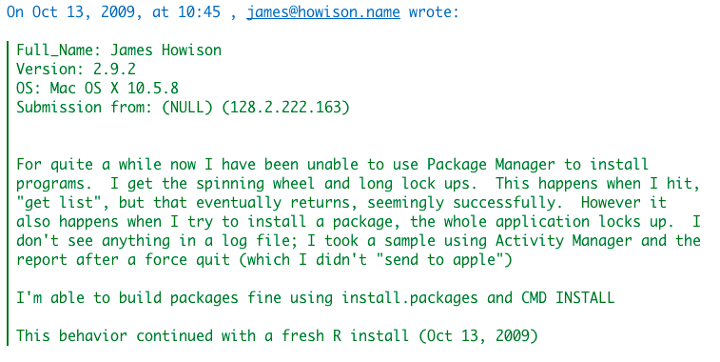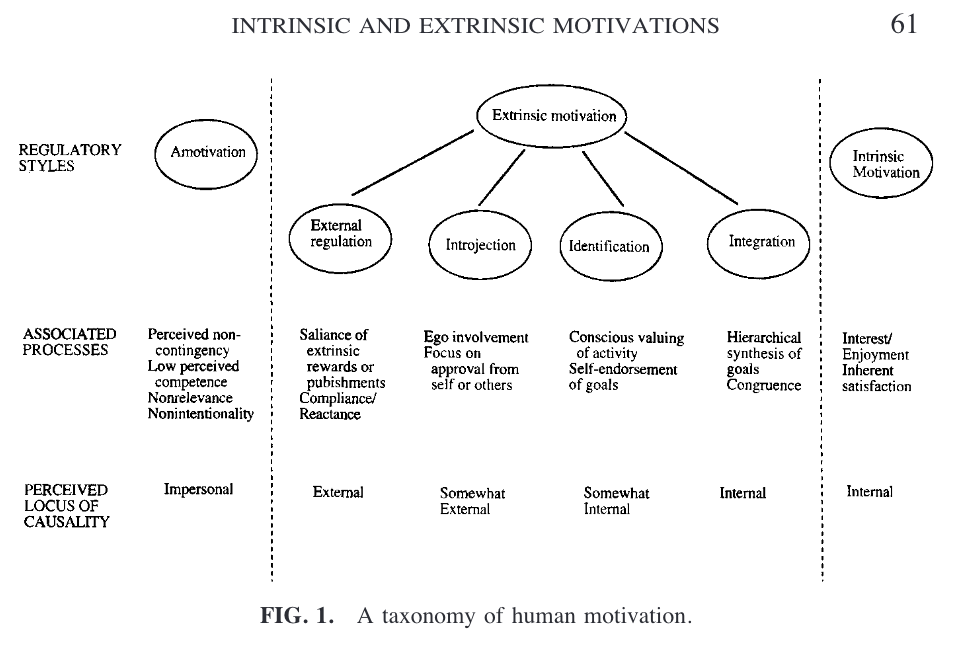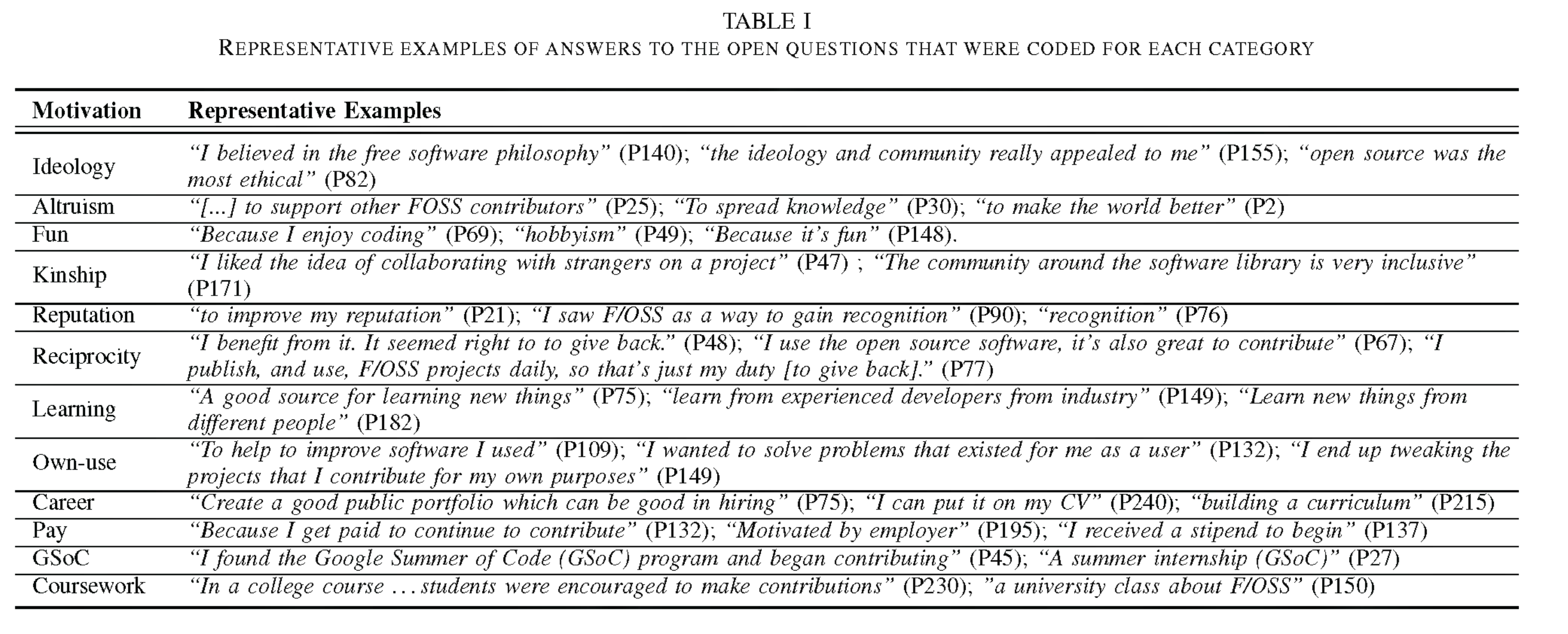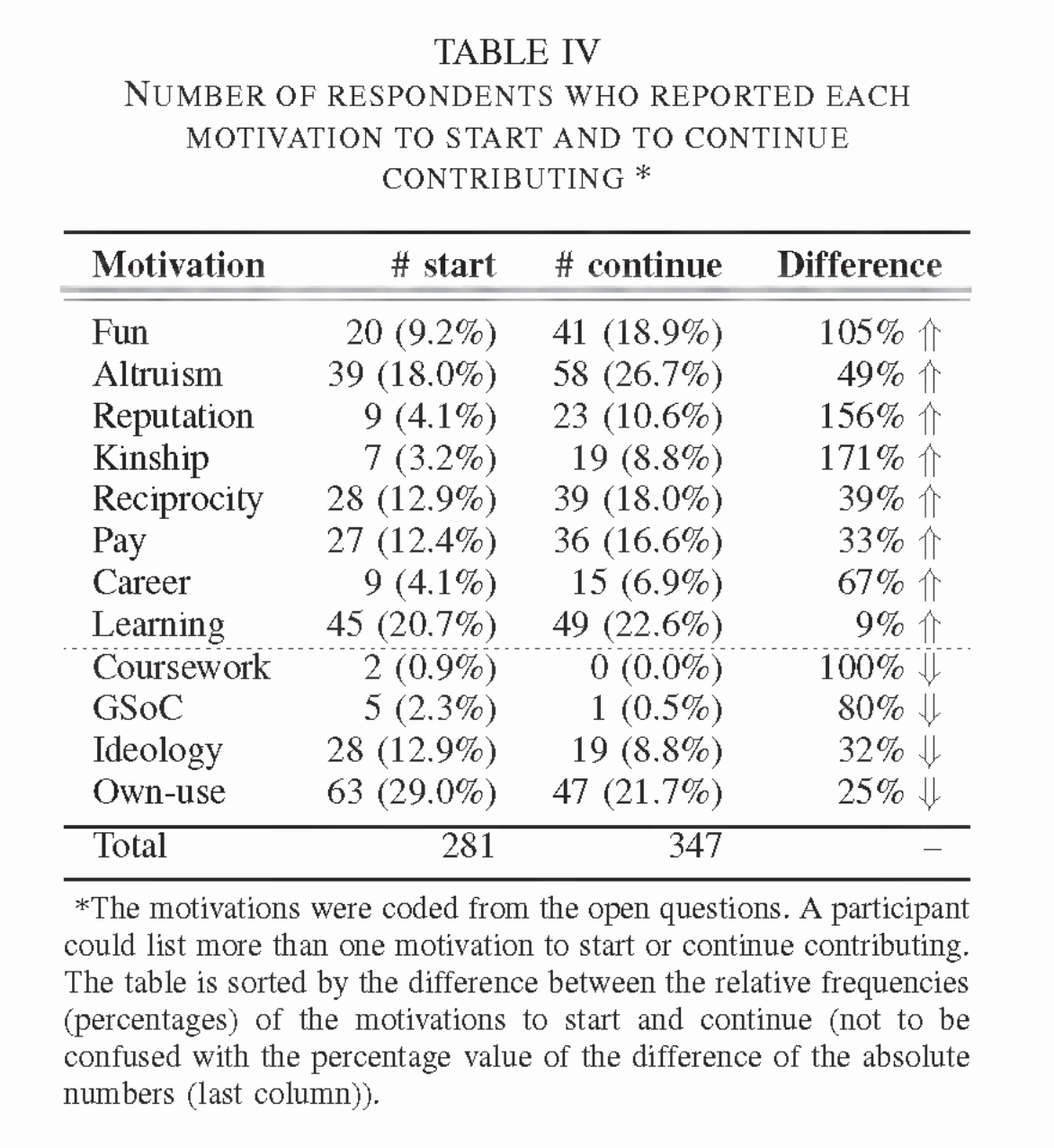5 Motivations
5.1 Readings
Raymond, E. S. and Moen, R. (2001). How to ask questions the smart way.
Two articles on how people became maintainers of ggplot2/tidyverse data science tools.
5m youtube video. Linus Torvalds talking about finding Kernel maintainers
5.2 How to ask questions people want to answer
Much of this material is based on How To Ask Questions The Smart Way, Eric Raymond and Rick Moen with the addition of academic references and frameworks.
Open source projects are famous for having direct access to very knowledgeable people about the source code. Unlike when you purchase software, you can very likely get questions in front of some of the people that wrote the underlying code.
But ask yourself why they are there, reading and answering user questions. What drives them, what motivates them?
5.2.1 RTFM
There is always a risk that a poorly asked question will be met with this response:

RTFM means to “Read the F***ing Manual” (which I’ll read as Read the Fine Manual). This rather unfriendly, and indeed unwelcoming response can occur when a question is asked in a way that doesn’t understand what it is that motivates people to participate in online support forums for software.
I note that open communities are not necessarily welcoming places. In fact they can be quite aggressive, even toxic. It is perhaps not unrelated that open communities are also no diverse. We will discuss this later in the course when we consider Bias and Lack of Diversity in @bias-and-lack-of-diversity
Lakhani and von Hippel (2003) studied the Apache httpd mailing list. They mailed a survey link to participants the first time they saw them post to the list, only mailing each person once. They received responses from 28.9% of info providers, and 16.6% info seekers.
They report that :
spending time in the forum had excellent ROI (return on investment) for information seekers (Seekers saved 9 minutes for every 1 minute spent writing questions).
Providers answer questions that are easy for them, rarely do they seek out additional information to help answer.
Information Providers invest a lot of time in the forum, average of 80 hours a year.
Key motivations to answer were reciprocity and reputation within Apache (not career prospects)
But information providers are primarily there to learn (>90% of time spent reading, not answering).
So, very knowledgeable people answer people’s questions when it is easy for them to do so (not spending time preparing and researching, this is not Q&A for $$$ like Quora). So what is it that brings them to these forums (thus making it quick and easy for them to answer): learning.
Huh? What do already knowledgeable people learn by hanging out watching less knowledgeable people ask questions?
Exercise
- What does someone learn from reading questions (and answers) in a technical forum?
- What does someone learn from answering?
5.2.2 Engaging intellectual curiosity
- Experts love interesting problems and the solving of them.
- Interesting problems are those that reveal some new insights
- Uninteresting problems are either obvious or unsolvable (poorly specified or not actionable).
- Ask questions like an intellectual partner.
5.2.3 Steps to answered question
Again, this is derived from How To Ask Questions The Smart Way, Eric Raymond and Rick Moen
Choose the right venue
Do (and show) your homework
Convey your situation
Ask an actionable question
Engage the interest of your audience
Follow up showing that you tried their suggestions. Don’t be the “Ok, fixed it now” guy
5.2.4 Examples
5.2.4.1 J Random Hacker
Directly from (http://www.catb.org/~esr/faqs/smart-questions.html#examples)[http://www.catb.org/~esr/faqs/smart-questions.html#examples]
Stupid: I’m having problems with my motherboard. Can anybody help?
J. Random Hacker’s response to this is likely to be “Right. Do you need burping and diapering, too?” followed by a punch of the delete key.
Smart: I tried X, Y, and Z on the S2464 motherboard. When that didn’t work, I tried A, B, and C. Note the curious symptom when I tried C. Obviously the florbish is grommicking, but the results aren’t what one might expect. What are the usual causes of grommicking on Athlon MP motherboards? Anybody got ideas for more tests I can run to pin down the problem?
This person, on the other hand, seems worthy of an answer. He/she has exhibited problem-solving intelligence rather than passively waiting for an answer to drop from on high.
In the last question, notice the subtle but important difference between demanding “Give me an answer” and “Please help me figure out what additional diagnostics I can run to achieve enlightenment.”
5.2.4.2 Getting it wrong (and yet so wrong)
The second example is one from my person experience.

sample command to help with debuggingI received two different responses:

So, what happened? Well, the second response made it much more clear.

So … I had done some things right, but I had made a mistake. Sending to the r-bugs mailing list implied that I thought there was a bug. But there wasn’t, it wasn’t a problem with R, it was a problem with my computer setup. I should have sent this to another forum first, one for general support, instead I had implied that there was a bug in R. Insulting people’s work is a risky way to try to get their help!
5.3 Theories of motivation
When organizational science asks about motivation we create taxonomies of different kinds of motivation.
A classic taxonomy is “intrinsic” vs “extrinsic” motivation. These labels are usually used informally, creating a distinction between motivations/desires that are somehow located “internally” (intrinsic) and those that are located “externally” to the individual (thus extrinsic).
Internally located motivation are things like enjoyment, fun. Externally located motivations are things that are worthwhile because of their outcomes in the world, such as getting paid, changing the world, pleasing others.
The distinction is useful, but is far from the end of the motivation story.
Exercise: Talk with your partner and identify:
- A thing you only do for fun
- A thing you only do for the rewards available
- A thing that seems both internal and external motivations (intrinsic and extrinsic)
- A thing you do that has neither.
Theorists have developed more elaborate frameworks. This one is from a theory of motivation called “self-determination theory” (Ryan and Deci, 2000):

This adds an additional dimension to the “location” of motivation which they call “Perceived locus of control” which is our own sense of whether someone is forcing us to do a particular activity, or whether we understand this to be our own choice.
In open source, people that stick around come to develop and talk about a real identification and integration of the goals of a particular project and their own goals. Some theorists talk about this leading to strong “organizational citizenship”.
Talking with your partner, can you identify:
- A situation where you do an activity because you think it is worthwhile, even if you don’t get rewards.
- A situation in which you gave up an activity you used to value … why did you give it up?
One core idea in self-determination theory is that human development and life satisfaction comes from undertaking activities that move to the right in the diagram: from externally caused through introjection, identification, and integration.
5.4 How are participants motivated?
In 2021 research, Gerosa et al, conducted a survey of OSS participant motivations, contacting around 250 respondents and including open response questions which they then categorized (“coded”) into different motivations. Here are examples from their data (GSoC means “Google Summer of Code” which pays people, mostly students, to participate in open source projects).

They asked participants about the motivations which they recall driving their decision to start contributing, and separately their decision to continue participating, allowing a comparison of motivations over time.
For both starting and continuing, they found these different motivations to be mentioned different amounts, and this table shows the number of respondents and the percentage of respondents that mentioned each one.

5.5 Resources
An article detailing how one open source participant is able to fund their work as a maintainer https://words.filippo.io/full-time-maintainer/
Fogel, K. (1999). Open Source Development with CVS. Coriolis Open Press, Scottsdale, AZ.
Crowston, K., Wei, K., Howison, J., and Wiggins, A. (2011). Free (libre) open source software development: What we know and what we do not know. ACM Computing Surveys, forthcoming.
Bacon, J. (2009). The Art of Community: Building the New Age of Participation. O’Reilly Media.
Raymond, E. S. and Moen, R. (2001). How to ask questions the smart way. Webpage. http://www.catb.org/esr/faqs/smart-questions.html
Ryan, R. M., & Deci, E. L. (2000). Intrinsic and Extrinsic Motivations: Classic Definitions and New Directions. Contemporary Educational Psychology, 25(1), 54–67. https://doi.org/10.1006/ceps.1999.1020
Gerosa, M., Wiese, I., Trinkenreich, B., Link, G., Robles, G., Treude, C., Steinmacher, I., & Sarma, A. (2021). The Shifting Sands of Motivation: Revisiting What Drives Contributors in Open Source. 2021 IEEE/ACM 43rd International Conference on Software Engineering (ICSE), 1046–1058. https://doi.org/10.1109/ICSE43902.2021.00098
